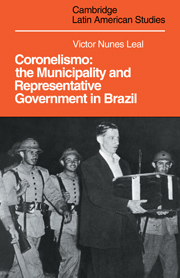Book contents
- Frontmatter
- Contents
- Editor's note
- Introduction by Alberto Venancio Filho
- A note on the term coronelismo
- 1 Notes on the structure and functioning of coronelismo
- 2 Powers of the municipalities
- 3 The elective principle in municipal administration
- 4 Municipal revenue
- 5 Organisation of the police and the judiciary
- 6 Electoral legislation
- 7 Conclusion
- Notes
- Bibliography
5 - Organisation of the police and the judiciary
Published online by Cambridge University Press: 05 October 2010
- Frontmatter
- Contents
- Editor's note
- Introduction by Alberto Venancio Filho
- A note on the term coronelismo
- 1 Notes on the structure and functioning of coronelismo
- 2 Powers of the municipalities
- 3 The elective principle in municipal administration
- 4 Municipal revenue
- 5 Organisation of the police and the judiciary
- 6 Electoral legislation
- 7 Conclusion
- Notes
- Bibliography
Summary
Up to the Constitution of 1824
As has already been pointed out, during Brazil's colonial period Portuguese law imperfectly demarcated the prerogatives of various functionaries, showing no concern – as was generally the case at that time – to separate functions according to their nature. Hence, an accumulation of administrative, police and jurisdictional functions, in the hands of the same authorities, related to each other in a hierarchical system which was not always rigorously maintained. The confusion between judicial and police functions persisted for a long time.
From the point of view which interests us here, we must mention in the first place the ordinary judges and the outside (visiting) judges who had police and juridical functions as well as administrative ones. There were also in some places special judges for orphans and criminal judges. The chambers, for their part, retained certain juridical functions although much reduced by the Phillipine Ordinances.
Under the judges already mentioned were to be found the inspectors of weights and measures and the parish judges [juizes de vintena]. The inspectors, apart from infringements of the council's bye-laws, also presided in certain cases of royal law relating to works or buildings, and imposed penalties, there being a right of appeal to the judges.
The parish judges, also known as pedestrian judges, with a small court, presided in settlements remote from the towns or the cities; they had no jurisdiction in criminal matters but they could arrest someone in flagrante, or by means of a writ, or through a formal accusation, presenting the detainee to the competent judge.
- Type
- Chapter
- Information
- CoronelismoThe Municipality and Representative Government in Brazil, pp. 100 - 117Publisher: Cambridge University PressPrint publication year: 1977

